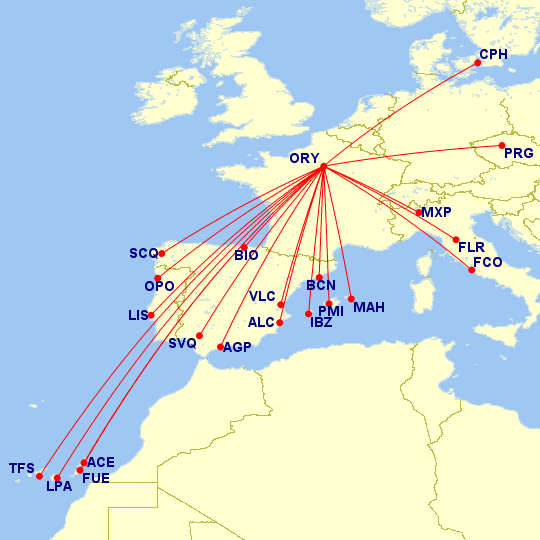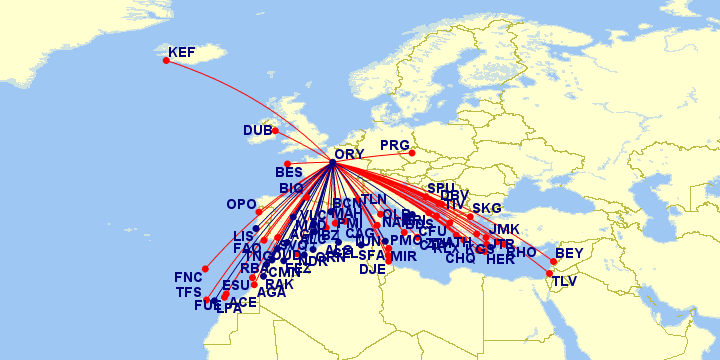Analysis: Vueling’s next step in Orly is IAG’s big chance to conquer France
Barcelona-based Vueling, the low-cost venture of IAG, was granted 18 daily slots at the capacity-constrained Paris Orly Airport, by the European Commission. The slots will be transfered from Air France, under the terms of the aid the airline received from the French state during the COVID-19 pandemic.
“Following an open procedure», said the EC’s Commissioner for competition, Margrethe Vestager, «Vueling will obtain 18 of the daily take-off and landing slots at Paris Orly airport, currently held by Air France. This will enable Vueling to expand its activities at this highly congested airport, helping to ensure fair prices and increased choice for European consumers. It also helps ensure the significant capital support to Air France enabled the airline face financial difficulties resulting from the coronavirus outbreak, without unduly distorting competition in the Single Market».
The competitive process privileged airlines that already had a base in Orly – Vueling already had aircraft based there – and also ranked the proposals by «level of capacity and connectivity that carriers would achieve using the slots made available by Air France», the EC stated.
The new flights are expected to start from November and the decision requires Vueling to base the aircraft in Orly with the new slots.
In a note published by Spain’s Hosteltur travel website, Vueling’s President Marco Sansavini stated «we’re decided to invest in Paris Orly and in France with a sustainable customer proposal. In Paris we will base our largest and most fuel-efficient aircraft, the Airbus A321, to benefit as much as possible from this opportunity».
How Vueling can benefit from this opportunity?
Sansavini’s statement continues, and gives a clue: «our competitive low-cost proposal will bring unique benefits to French and European customers, including the codeshare and the connection of traffic with other IAG airlines».
Looking at the airline’s current Orly network, its focus is clear: besides a number of exceptions, like big European capitals and the Florence base, its stronghold is transporting passengers from France to Spain – where it’s a very strong, established player.

In the context of IAG, the two most obvious markets are missing: London and Madrid.
While no one expects British Airways to give up gold-valued Heathrow slots for Vueling feeding, Madrid is already served by Iberia with 31 weekly frequencies as of this week; Vueling, however, is expected to start Orly-Madrid connections already in September the 30th, using up slots from the high-season destinations.
For November, however, Vueling is still not selling Madrid-Orly flights; it seems like the natural path for the airline, however.
The logic is simple: as the low-cost unit of the IAG group, Vueling can consistently deliver lower unit cost (and therefore higher margins) for the short-haul operations of the group, whilst feeding the rest of the network – short and long-haul – of the group.
In the London segment, already in the airline’s system a Gatwick run is for sale from November the 1st, albeit IAG has almost no presence in that airport at the moment which means no feed is needed; London remains, nevertheless, a very important point-of-sale for the group, which is why a substantial growth in the route can be expected. From December the 1st, Vueling is selling tickets from two to three daily flights between Orly and Gatwick.
But besides the feeding aspect of the equation, one must remember that Vueling is a carrier in its own right and customer base; one that gave it an operational margin (9.8%), in 2019, better than Iberia’s (8.8%). Not only that, it is already very relevant in France and especially in Orly – which might have granted it the slots.
According to data collected by Aviacionline, at the current moment Vueling connects Orly to 21 nonstop destinations with 171 weekly flights; in 12 of these markets, which represent 133 of the frequencies, Vueling is the leader in frequencies, and in five (Bilbao, Copenhagen, Florence, Milan/Malpensa and Santiago de Compostela) it is the sole carrier. It is IAG’s most relevant presence in France in terms of scale and reach.
17 daily slots represent 119 weekly flights which, if Vueling sticks to Sansavini’s promise of allocating the A321, will represent a capacity leap that could annoy the leader in the airport, Air France-KLM.
Right now in Orly, this group is represented by Transavia, who is the low-cost branch of the conglomerate. While Air France retains a sizeable domestic (and the bulk of the long-haul domestic) operation in the airport, most of the connections are operated by Transavia.

The airline, at this moment, serves 62 destinations with 343 weekly flights. In 43 of these connections (representing 251 weekly connections) it is the leader, and in 26 it detains a monopoly.
While Vueling won’t have the frequencies to become the leader in Orly, it is exactly this dominant position of Air France-KLM that will be challenged. Vueling, and by consequence IAG, will finally have the means to set foot in France.
The last time it tried doing so, using LEVEL France in low-cost, long-haul operations with limited feed, IAG lost millions, much because of COVID-19 hence the group saw the operation as pointless. Now perhaps focusing on the good old short-haul operations with a estabilished company this might work.

/https://aviacionlinecdn.eleco.com.ar/media/2021/09/DSC_0448.jpg)
Para comentar, debés estar registradoPor favor, iniciá sesión